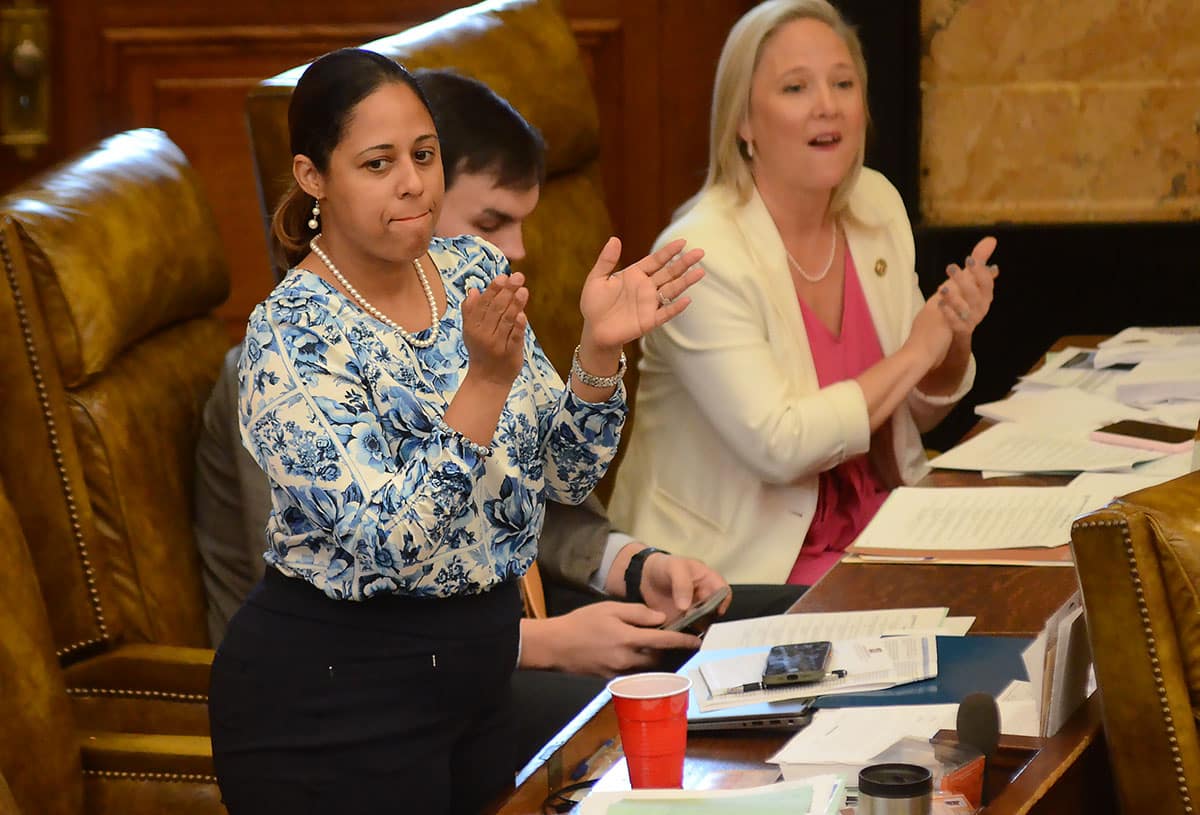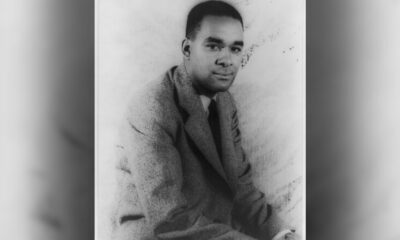Mississippi Today
Q&A with Rep. Zakiya Summers on Right to Contraception Act

Note: This Q&A first published in Mississippi Today’s InformHer newsletter. Subscribe to our free women and girls newsletter to read stories like this monthly.
Rep. Zakiya Summers, D-Jackson, is a second-term lawmaker who has been outspoken on the need for Medicaid expansion and on a number of women’s health issues. Summers authored House Bill 1154 this session to ensure access to contraception.
After the fall of Roe v. Wade in June of last year, the federal constitutional right to contraception became a topic of national discussion. U.S. Supreme Court Justice Clarence Thomas called on the Supreme Court to review Griswold v. Connecticut, the landmark decision in which the court ruled that married couples have the right to access contraception.
Soon after, 195 Republican members of the U.S. Congress, including every Mississippi Republican in the House, voted against the “Right to Contraception Act,” which would have codified the right to contraception under federal law. Since then, some state legislatures have introduced bills to restrict access to contraceptives or allowed health providers to refuse to provide or cover contraception.
The Dobbs ruling made access to contraception more critical in Mississippi, which has among the country’s highest rates of unplanned pregnancy and maternal mortality and the highest rate of infant mortality.
Gov. Tate Reeves has been unclear about his stance on contraception, refusing to rule out contraceptive bans or define what he considers contraception versus “abortion-inducing” pills and devices.
Mississippi Today spoke with Summers hours before the House passed a Medicaid expansion bill and the day before a presumptive eligibility bill, co-authored by Summers, was sent to the governor for approval.
Editor’s note: This Q&A has been edited for length and clarity.
Mississippi Today: Can you tell us a little bit about yourself? What have you been focused on in past sessions and what’s on your agenda this session?
Zakiya Summers: I am Zakiya Summers. I serve as state representative for House District 68, which covers Hinds and Rankin counties. I’m in my second term, so this is my fifth session. The first term was a bit of a learning curve even though I had been a part of the policy advocacy table for a number of years, it’s different when you’re in the belly of the beast. I really prioritized five issue areas: education, election reform, increasing access to health care, infrastructure and economic development. We were pretty successful during the first term – we got a few things passed through our work with colleagues across the aisle.
My proudest moment has been to be in a position where I was able to cast my vote to take down the Confederate flag and put up a new flag. It was very personal for me because the flag was a very traumatizing symbol, even for my husband. I was honored and privileged to be able to do that after many, many years, decades, of a lot of different people who were working on that issue for a long time.
Another bill that I’m really proud of is a law that now implements computer science curriculum in K-12 education. I thought that was extremely important because I understand that in order for us to do some of the things that Gov. Reeves talked about in his State of the State around really helping to build wealth and prosperity in the state of Mississippi, we have to prepare young people for the jobs of the future. And I know that jobs of the future will be heavily technology-based. I mean, we saw that in the huge economic development deal that we did at the beginning of the session with Amazon web services.
This year, I’m pushing the Right to Contraception Act. I’m also pushing a bill called the Crown Act which would prohibit hair discrimination in schools and I think it’s gaining some momentum.
MT: Can you tell us a little bit about the story behind the Right to Contraception Act?
ZS: The Right to Contraception Act is really an effort to be proactive and to raise the bar, elevate the message around preventative health. We’ve received so many dismal reports from health experts, from our medical health officer, from out chief health officer about the really negative, unfortunate health outcomes and health disparities we have in the state of Mississippi. Mississippi is 50th on the list in the entire country with those health disparities. And we know that when families have access to the things they need they can make the best decisions for their lives and for their families and for their future. And so we see the Right to Contraception Act as an opportunity for Mississippians to have unfettered access to contraception if they would like to have that and it will help them to make the best decisions for them.
MT: It might seem far-fetched to some people that Mississippians could lose access to contraception. But we’ve seen with recent events – IVF in Alabama, for instance – that liberties we take for granted aren’t always guaranteed. Why is it important in the Legislature to predict what may happen down the road and get ahead of it with policies and laws that preserve the liberties we take for granted?
ZS: It’s so important, especially when you see what’s happening across the landscape. We never would have thought that Roe v. Wade would be rolled back but elections have consequences. And when you don’t vote or you don’t vote for your best interests, you end up getting people in positions that can make these appointments to these courts and they end up rolling back precedents that we’ve had for decades. And it becomes more than just partisan politics – it becomes a matter of life and death.
We’ve seen with the overturning of Roe v. Wade that individuals no longer have the ability to make their own decisions about their health and their bodies. And then we also saw as a result of that decision an opinion by Supreme Court Justice Thomas that even hinted at removing the right to contraception. And then, when our governor was questioned about it, he was not clear about how he would move or what he would support or oppose around the issue.
You mentioned the IVF decision that came out of Alabama just last week. And now we’re talking about if an embryo is a person. So we’re beginning to see these – I really think they’re unintended consequences. Because I really don’t think that when the fight was around getting rid of Roe v. Wade that they even had the thought that these kinds of things would begin to roll out. And so what we want to do in Mississippi is we want to be pro-life all the way. And I actually see the Right to Contraception Act as a pro-life measure, because if we want to make sure that our boys and girls, men, women, families, are set up in the very best situation that they can possibly be in, where they can remain in a state that’s their home, but provides the conditions by which they’re not just surviving but thriving, then we should support the Right to Contraception Act because that is an important piece to this equation for them to be able to make those healthy decision for themselves.
MT: You helped author House Bill 539 on presumptive eligibility for pregnant women. It passed the House a few weeks ago now – quite early on in the session. Are you feeling hopeful that it will have more success this year than last year?
ZS: I am feeling incredibly optimistic this session. We have a speaker now, Speaker Jason White, that has encouraged and urged all of us to work on a bipartisan level. We are seeing our colleagues across the aisle actually bring us into conversations on legislation that we have been introducing for a number of years that are finally getting some light and attention. I think the energy has changed in the House and I really appreciate the Speaker, as well as the chairmen and chairwomen we have on committees right now, wanting to work with the Democrats. Because, I mean, let’s face it, we are in a super minority – we get that, we understand that. But we believe that Mississippians want us to work together, because the best ideas and the best solutions to the problems many of us face come from when we can get together and hash it out.
We know that we may not get everything we want. But let’s try to build some consensus and at least commit to working together as we move forward. And then Speaker White has also been very adamant about working with leadership in the Senate, as well. So that we can build a positive force on both ends of the Capitol and hopefully get some stuff to the governor’s desk that will be historic for the state of Mississippi.
MT: There are a couple of bills on chemical endangerment this year, which would allow for prosecution of pregnant women who take drugs during pregnancy. The author of one of the bills says it would not prosecute women for taking the abortion pill – that abortion pills are protected because they are prescriptions. But the author of the other chemical endangerment bill said that could be open for debate. What do you make of the obscurity in this legislation and do you think that obscurity is dangerous?
ZS: I think with any bill where you’re getting one perspective that’s different from the other, it’s something that we need to watch. Because it could put our autonomy at risk. And we need to know how is this going to impact the folks that live in our communities on whether or not they can access the things they need.
And, you know, we don’t represent the demographics of our state here in the Legislature. Our population, we have more women than we do men, but the percentage here, in the House as well as the Senate, is very, very low. I think we have a total of 17 women who serve as legislators. Now that doesn’t necessarily mean that because you’re a woman and you serve as a legislator that you’re going to do what’s best for women. But what I will say is that a man that has never had a uterus and has never carried a child and doesn’t understand the risks and also the fear that surrounds the ability and process of getting pregnant and having a child, it’s a real thing. When you look at the rates of our maternal mortality and infant mortality in the state, it’s something that our young women have in the back of their minds. And they want to be able to survive this pregnancy and also have a healthy child as an outcome. And then in addition to that be able to raise a child in a healthy environment. And so what we shouldn’t be doing, especially coming from a man, a man should not be telling women what to do with their bodies. I mean, that’s just the bottom line. And we should be able to get together, work with women, and work with experts that can give us the knowledge and the facts around what is good and what’s available for women and their families. Instead of doing everything we can to be punitive against women, we should be trying to help them be successful in the state.
MT: Are there any other bills you’re keeping an eye on? How are you feeling about Medicaid expansion this year?
ZS: I am so overwhelmed with Medicaid expansion. It passed out of committee yesterday and it’s going to come up in the House today. This is the first time in 10 years that we’ve even seen Medicaid expansion be put on the table. It’s a huge deal for the state of Mississippi for all the reasons I’ve talked about today with the health disparities and the negative health outcomes we have in the state. So I’m very excited about that. I am hopeful that our colleagues in the Senate will stand strong and also support this legislation and if, and I say if, a veto were to happen, that we also stand united and override that veto. Because the working families in our communities and our districts across the state are depending on this. They’re depending on us to do the right thing, to give them a chance to work, be healthy, take care of themselves, take care of their families, and achieve that dream of prosperity that Gov. Reeves talked about this week.
This article first appeared on Mississippi Today and is republished here under a Creative Commons license.![]()
Mississippi Today
On this day in 1945, Richard Wright’s memoir was top-selling book in U.S.
April 29, 1945

“Black Boy,” Richard Wright’s memoir about his upbringing in Roxie, Mississippi, became the top-selling book in the U.S.
Wright described Roxie as “swarming with rats, cats, dogs, fortune tellers, cripples, blind men, whores, salesmen, rent collectors, and children.”
In his home, he looked to his mother: “My mother’s suffering grew into a symbol in my mind, gathering to itself all the poverty, the ignorance, the helplessness; the painful, baffling, hunger-ridden days and hours; the restless moving, the futile seeking, the uncertainty, the fear, the dread; the meaningless pain and the endless suffering. Her life set the emotional tone of my life.”
When he was alone, he wrote, “I would hurl words into this darkness and wait for an echo, and if an echo sounded, no matter how faintly, I would send other words to tell, to march, to fight, to create a sense of the hunger for life that gnaws in us all.”
Reading became his refuge.
“Whenever my environment had failed to support or nourish me, I had clutched at books,” he wrote. “Reading was like a drug, a dope. The novels created moods in which I lived for days.”
In the end, he discovered that “if you possess enough courage to speak out what you are, you will find you are not alone.” He was the first Black author to see his work sold through the Book-of-a-Month Club.
Wright’s novel, “Native Son,” told the story of Bigger Thomas, a 20-year-old Black man whose bleak life leads him to kill. Through the book, Wright sought to expose the racism he saw: “I was guided by but one criterion: to tell the truth as I saw it and felt it. I swore to myself that if I ever wrote another book, no one would weep over it; that it would be so hard and deep that they would have to face it without the consolation of tears.”
The novel, which sold more than 250,000 copies in its first three weeks, was turned into a play on Broadway, directed by Orson Welles. He became friends with other writers, including Ralph Ellison in Harlem and Jean-Paul Sartre and Albert Camus in Paris. His works played a role in changing white Americans’ views on race.
This article first appeared on Mississippi Today and is republished here under a Creative Commons Attribution-NoDerivatives 4.0 International License.![]()
The post On this day in 1945, Richard Wright's memoir was top-selling book in U.S. appeared first on mississippitoday.org
Note: The following A.I. based commentary is not part of the original article, reproduced above, but is offered in the hopes that it will promote greater media literacy and critical thinking, by making any potential bias more visible to the reader –Staff Editor.
Political Bias Rating: Centrist
This article focuses on the historical context of Richard Wright’s memoir, “Black Boy,” and its impact on American literature and race relations. It presents facts about Wright’s life and work without taking an overt political stance. The tone is primarily reflective and factual, detailing Wright’s literary achievements and his contributions to addressing racial issues in America. The language is neutral and descriptive, with no evident bias toward either side of the political spectrum. It does not push a specific ideological agenda but instead highlights historical and literary significance.
Mississippi Today
Trump appoints former Gov. Phil Bryant to FEMA Review Council as state awaits ruling on tornadoes
President Donald Trump has appointed former Mississippi Gov. Phil Bryant to the FEMA Review Council, which Trump has tasked to “fix a terribly broken system” and shift disaster response and recovery from federal to state government.
The appointment comes as Mississippi awaits a response from the Trump administration on whether it will approve Gov. Tate Reeves’ request for a federal disaster declaration for deadly tornadoes in mid-March. The federal declaration, which Reeves requested April 1, would allow families and local governments devastated by the storms to receive federal assistance. Trump recently denied a similar request for Arkansas.
Trump has said states should shoulder more of the burden for disaster response and recovery, and he and Homeland Security Secretary Kristi Noem have threatened to shut down the Federal Emergency Management Agency altogether.
“I am proud to announce the formation of the FEMA Review Council, comprised of Top Experts in their fields, who are Highly Respected by their peers,” Trump wrote on social media. “… I know that the new Members will work hard to fix a terribly broken System, and return power to State Emergency Managers, who will help, MAKE AMERICA SAFE AGAIN.”
Trump listed other members of the council, including Secretary of Defense Pete Hegseth and Govs. Greg Abbott of Texas and Glenn Youngkin of Virginia.
Bryant, a longtime political ally of Trump, on social media wrote he is, “Honored to receive this appointment …” and that “Unfortunately, we’ve earned a lot of experience with natural disasters and recovery in Mississippi. Let’s Make America Safe Again.”
Mississippi saw seven deaths and an estimated $18 million in destruction from multiple tornadoes on March 14-15, the same storm system that caused damage in Arkansas. The Mississippi Emergency Management Agency reported that 233 homes were destroyed across 14 counties, and hundreds more were damaged.
During the initial aftermath, Reeves told reporters he believed there was a “high likelihood” the state’s damages from the March tornadoes would meet the threshold for FEMA’s Individual Assistance, which provides direct payments to disaster victims.
The Trump administration’s FEMA has denied federal assistance for flooding in West Virginia, tornadoes in Arkansas and a storm in Washington state, and refused North Carolina’s request for extending relief after Hurricane Helene.
After Hurricane Katrina’s devastation in 2005, Mississippi received nearly $25 billion in federal relief spending, which state leaders have credited with saving the state from ruin and allowing communities and families to rebuild.
This article first appeared on Mississippi Today and is republished here under a Creative Commons Attribution-NoDerivatives 4.0 International License.
Note: The following A.I. based commentary is not part of the original article, reproduced above, but is offered in the hopes that it will promote greater media literacy and critical thinking, by making any potential bias more visible to the reader –Staff Editor.
Political Bias Rating: Center-Right
The content presents a fairly neutral tone but leans towards a center-right perspective, particularly in its framing of President Trump’s actions and the appointment of former Mississippi Governor Phil Bryant. It highlights the argument for more state-level responsibility in disaster management, a position typically associated with conservative views. The reference to the Trump administration’s denial of federal assistance to certain states, including Arkansas, aligns with a more fiscally conservative stance that prioritizes reducing federal intervention. However, the mention of the substantial federal aid Mississippi received after Hurricane Katrina adds a historical balance to the perspective, indicating that the piece does not fully align with extreme conservative views.
Mississippi Today
Chris Lemonis fired, national search underway for Mississippi State baseball
Not quite four years after guiding Mississippi State to a baseball national championship, head coach Chis Lemonis has been fired, effective immediately.
Assistant coach Justin Parker will serve as interim head coach for the remainder of the season.
Mississippi State made the announcement in a press release Monday afternoon.
“A change in leadership is what is best for the future of Mississippi State baseball,” State athletic director Zac Selmon said. “We have not consistently met the standard of success that our university, fans and student-athletes expect and deserve. I want to thank Coach Lemonis for his work and the time he gave to our program, including a national championship in 2021. We appreciate his efforts and wish him and his family all the best moving forward.”
A national search is underway to identify the program’s next head coach, Selmon said.
“In a team meeting moments ago, I expressed to our student-athletes the confidence we have in their abilities and the potential they have for the remainder of the season,” Selmon said. “I encouraged them to compete with pride, resilience, and intensity. With the hard work, preparation, and talent already within this group, we are committed to putting them in the best position to finish the season competing at the highest level.
“Mississippi State is the premier job in college baseball. The tradition, the facilities, the NIL offerings and the fan base are all second to none. Dudy Noble Field is the best environment in the sport, period.”
The current Bulldogs have a 25-19 record and are 7-14 in the SEC. Most recently, the Bulldogs lost two of three weekend games to Auburn, the nation’s 11th-ranked team. State has lost its last two SEC series and five of seven this season. The Bulldogs are currently No. 45 in the nation in ratings percentage index (RPI) and are in danger of not making the NCAA Tournament for the third time in four years.
Lemonis’ MSU teams won 232 games and lost 135 in his six-plus seasons. Hired by former MSU baseball coach and athletic director John Cohen from Indiana, Lemonis has an overall coaching record of 373-226-2.
“This program is built for success,” Selmon said. “Our history proves it, and our future demands it. We are one of only four programs in NCAA history to reach the College World Series in six consecutive decades. With 40 NCAA Tournament appearances, 12 trips to Omaha, 11 SEC regular season titles, and a national championship, our program has always been a national contender. That is the bar. We’re going to find a leader who will embrace that, elevate our program and compete for championships.”
This article first appeared on Mississippi Today and is republished here under a Creative Commons Attribution-NoDerivatives 4.0 International License.
Note: The following A.I. based commentary is not part of the original article, reproduced above, but is offered in the hopes that it will promote greater media literacy and critical thinking, by making any potential bias more visible to the reader –Staff Editor.
Political Bias Rating: Centrist
The content provided is a straightforward news report about the firing of a baseball coach, Chis Lemonis, following his achievement of winning a national championship. The information is factual and does not indicate any political leaning, ideology, or bias. It is neutral in tone and intent.
-

 SuperTalk FM7 days ago
SuperTalk FM7 days agoNew Amazon dock operations facility to bring 1,000 jobs to Marshall County
-

 News from the South - Missouri News Feed3 days ago
News from the South - Missouri News Feed3 days agoMissouri lawmakers on the cusp of legalizing housing discrimination
-

 Mississippi Today2 days ago
Mississippi Today2 days agoDerrick Simmons: Monday’s Confederate Memorial Day recognition is awful for Mississippians
-

 Mississippi Today5 days ago
Mississippi Today5 days agoStruggling water, sewer systems impose ‘astronomic’ rate hikes
-

 News from the South - Georgia News Feed7 days ago
News from the South - Georgia News Feed7 days agoOrganization files ethics complaint against Warnock | Georgia
-

 News from the South - West Virginia News Feed5 days ago
News from the South - West Virginia News Feed5 days agoIs West Virginia — and the rest of the country — prepared to care for our seniors?
-

 News from the South - Texas News Feed6 days ago
News from the South - Texas News Feed6 days agoStorms Move Through Houston: Expect Heavy Rain and Possible Flooding This Afternoon
-

 News from the South - West Virginia News Feed7 days ago
News from the South - West Virginia News Feed7 days agoWork Zone Safety Week takes on extra meaning after recent WV worker's death



















































